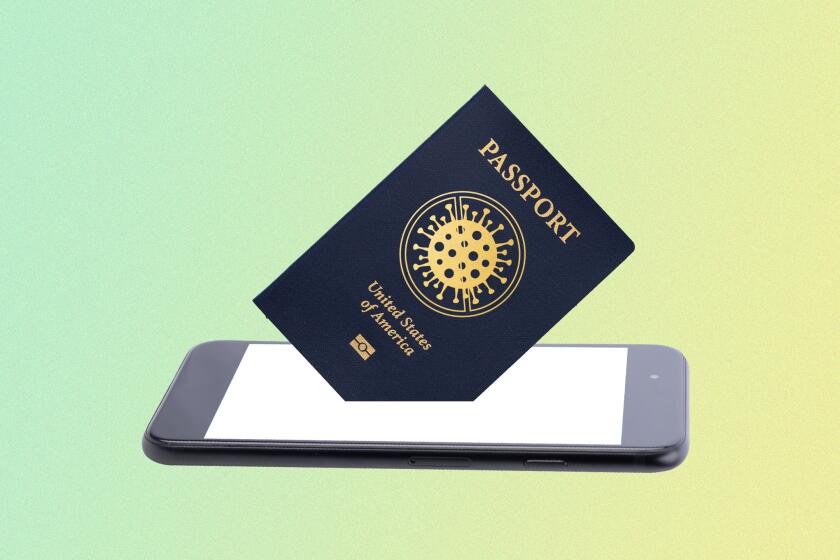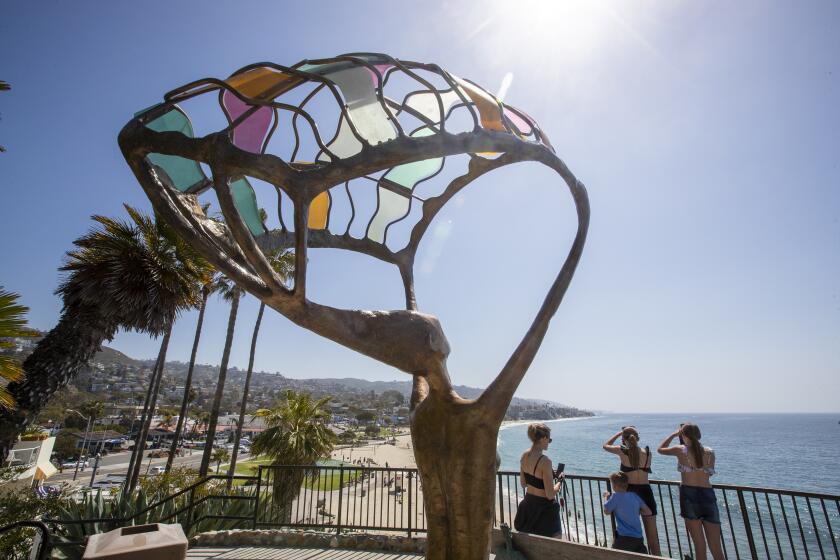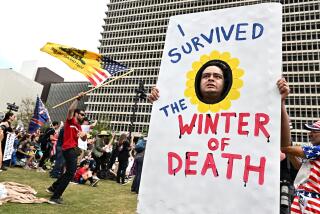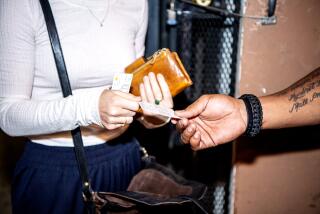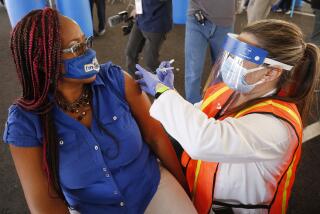Hundreds in Orange County protest COVID vaccine passports: ‘You’re not going to brand us’
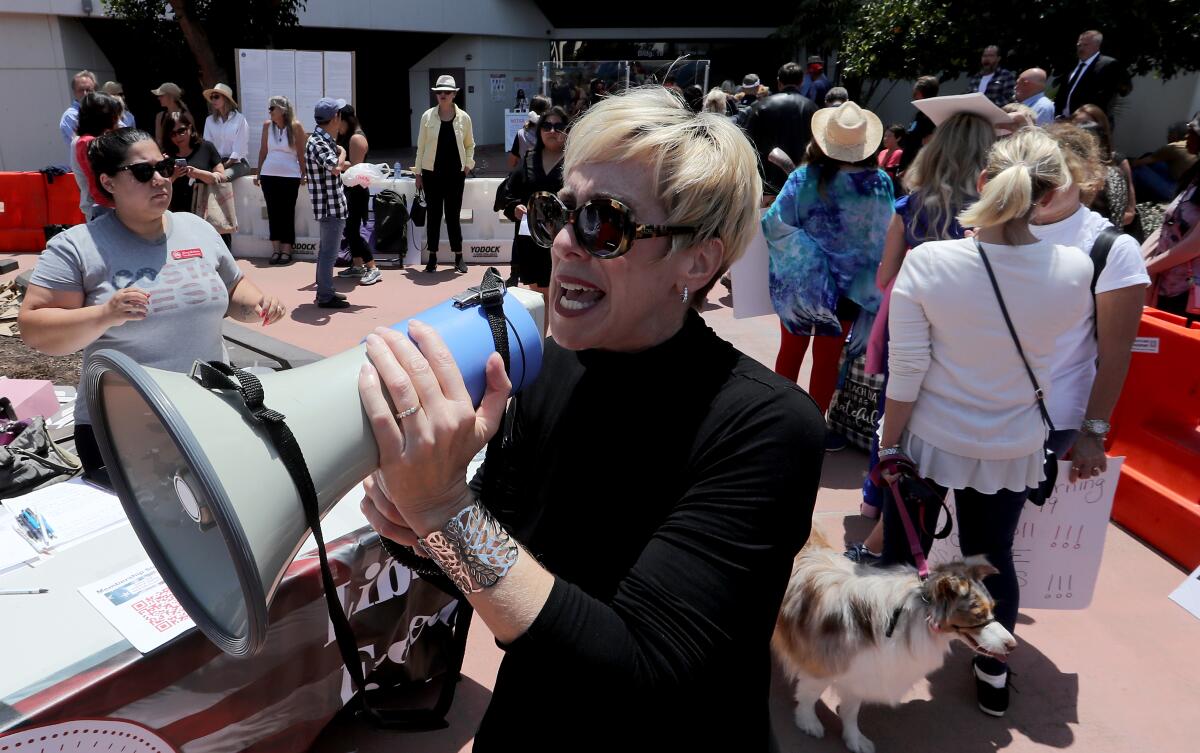
- Share via
On the same day that Orange County recorded some of its most positive coronavirus statistics to date — nearing the least restrictive yellow tier in the state’s reopening blueprint — hundreds of protesters gathered to blast the Board of Supervisors for a proposal to create “vaccine passports,” or digital records that document COVID-19 vaccination status.
The public backlash began in April after the county announced plans to launch a pilot program for credentialing. Almost immediately, a vocal group of opponents expressed concern that the digital records would be used to “track” people and reveal private healthcare information. Opponents also said it would allow the county to favor residents who chose to get vaccinated.
County officials have repeatedly said the claims are not true.
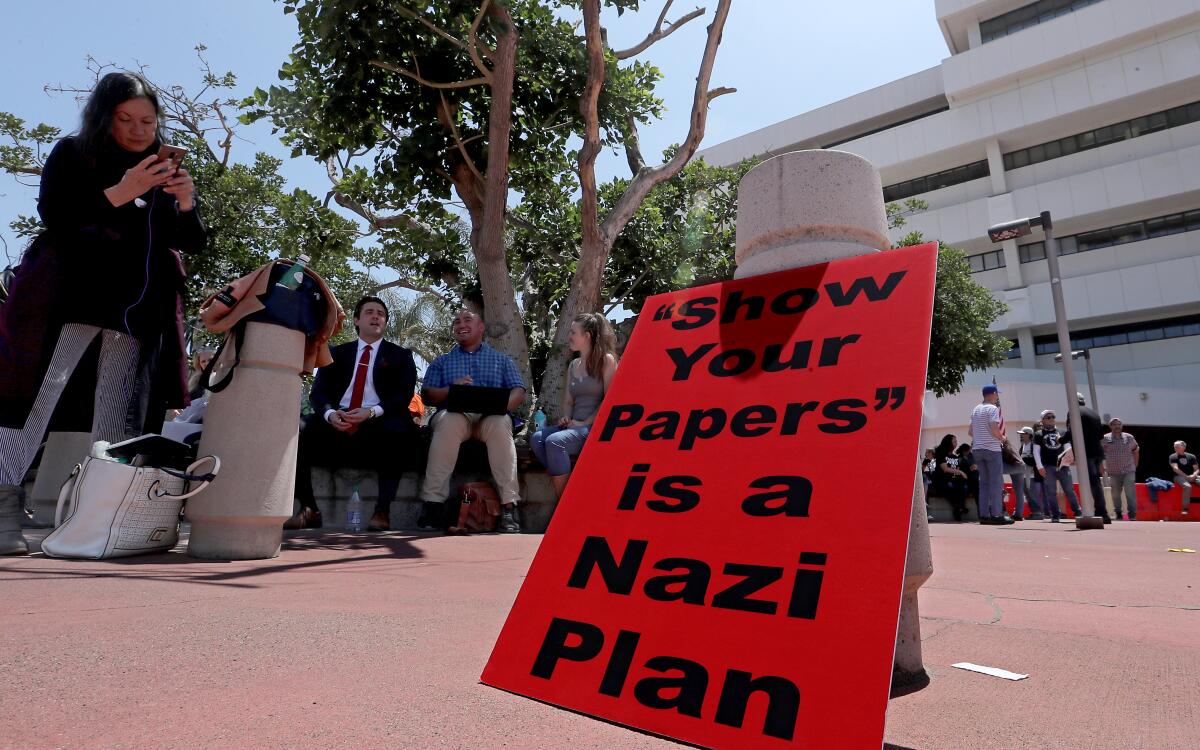
But inside the meeting hall Tuesday, tensions reached a boiling point after Chairman Andrew Do proposed tabling the plan in an attempt to remove distractions and refocus on the county’s vaccination efforts.
“The noise around this whole vaccine passport has reached the point where it’s becoming counterproductive,” Do said. “On the eve of our county going into the yellow tier — we are about to open up even more — the goal for us, in order to adequately protect all of us ... is going to be vaccination.”
The county on Tuesday moved within striking distance of the state’s most lenient tier of economic reopenings, posting its first of a required two weeks of qualifying data needed to advance. Orange County has been in the orange, or moderate tier, since March 29.
California officials say they do not plan to require vaccine verification, but new rules incentivize private venues to seek proof of tests or inoculation.
Supervisor Katrina Foley strongly opposed Do’s proposal to pause the digital record-keeping plan, noting that the county’s economy is highly dependent on tourism, theme parks, sporting events and concert venues — many of which sell tickets online — and that digital proof of vaccination could be key to their ability to operate at maximum capacity. Foley also expressed concern that the county had already paid for the creation of the service.
“This was a convenient, opt-in, voluntary opportunity for individuals to be able to benefit their businesses as well as be able to go about living their lives,” she said. “We are appeasing a very small faction of our community who actually are not going to get vaccinated. They’ve already told us they don’t believe in vaccines.”
The proposal for the pilot program included issuing a QR code to vaccine recipients who registered for appointments through the county’s Othena app. County officials stressed that digital vaccination records would provide an alternative to the paper cards issued by the Centers for Disease Control and Prevention, which can be easily lost or destroyed.
Many residents were not convinced.
By noon, at least 580 people had queued up to offer public comment during the county meeting, including some from Los Angeles. Each was given 30 seconds to speak, and the overwhelming majority used the opportunity to urge county officials to reject the passport. Some also declared the pandemic a hoax.
“I will not be bullied, coerced, harassed in any way, shape or form ... into participating into a massive human experiment in order to fit in,” said one woman, who did not provide her name.
Another speaker cited county data, arguing that the majority of Orange County residents who haven’t yet been vaccinated are against vaccines and the use of passports.
“It’s not about availability, it’s about the legal right of choice,” she said. “I’m a millennial in my prime who dreams of having a family, and I’m terrified to bring children into a world that violates their conscience and disrespects their freedom as citizens of the United States of America.”
According to The Times’ tracker, about 51% of Orange County residents have received at least one dose of the COVID-19 vaccine, and 38% are fully vaccinated. The numbers are about on par with the state, where 49% of residents have received at least one dose and 36% have been fully vaccinated. Nationwide, about 58% of adults have received at least one shot, according to the CDC.
But vaccination rates in Orange County are slowing, as they are in other parts of the state. The county last week announced it would close mass vaccination sites at the Anaheim Convention Center, O.C. Fair & Event Center, Soka University and Santa Ana College on June 6 amid dwindling demand. The last first-dose Moderna appointments were offered May 8, and the last first-dose Pfizer appointments will be offered Saturday.
Images posted to social media showed that word of Tuesday’s protest had been circulating online and through fliers describing Orange County as “the battleground of the nation.” Leigh Dundas, a lawyer best known for her fiery crusade against childhood immunization laws, took to YouTube to encourage people to show up to the Board of Supervisors’ meeting in droves.
“I cannot underscore enough: This is the hill we die on,” she said. “We cannot allow the people of America to be segregated or to be made prisoners in their own homes.”
One protester Tuesday described the crowd as “patriots,” and said he was there to make it clear that “America in general is not going to be OK with this.”
Behind him, scores of people chanted and waved signs and American flags. Elsewhere, a pop-up tent offered Donald Trump merchandise for sale.
We explain what vaccine passports are, how they work, where they’ve been implemented, and why some people object to them.
Dr. Aaron Kheriaty, director of the medical ethics program at UC Irvine and a member of the vaccine task force in Orange County, said Tuesday that he was in favor of COVID-19 vaccines but also that he understood the outpouring of opposition.
“I understand why it’s becoming so politicized,” he said, because “if private entities start developing policies that deploy that tool as a gatekeeper, then I think the fears and concerns that many people are trying to express right now actually will be borne out.”
Kheriaty said the county has already done a good job of vaccinating those who need it most — the elderly and residents with underlying health conditions — and said those who remain unvaccinated may have religious, health or other personal reasons for declining a shot.
Requiring vaccines — whether at a government level or simply for entry to places like restaurants, airplanes, grocery stores and schools — could put those people at a disadvantage, he said.
“I would consider blocking off access to otherwise ordinarily available public activities as a fairly heavy-handed form of coercion,” he said. “I’m ‘pro’ let the person decide. Let the individual weigh their own risks and benefits.”
But county officials have repeatedly stated that no such restrictions would be included with the digital record.
Do emphasized that the digital “passport” was meant as a supplement to paper cards. Taking the program off the table would mean residents must maintain their own records.
“If you were to lose [the card], you would have to go through the normal process of requesting a duplicate, but at least it takes that off of the discussion and we can move on as a county,” he said, noting that vaccinating the remaining 30% of Orange County residents needed to reach herd immunity would be difficult with so much resistance.
“However large or small it is, it affects people — some of our residents — from getting vaccinated.”
After several weeks in the orange, or moderate, tier of California’s COVID-19 reopening system, Orange County is now within striking distance of its widest reopening.
The debate around vaccine passports is not limited to Orange County. When the state in April announced that some businesses could hold larger events if they verify that attendees are vaccinated, some said it was akin to an incentive.
Experts have said that employers, colleges and other sectors probably will institute vaccination requirements. Already, at least one person in California has been arrested and charged with selling fake COVID-19 vaccination cards.
Several speakers at the meeting Tuesday compared vaccines to “gene therapy” and said the proposed passport was akin to the yellow stars Nazis ordered Jews to wear as a means of identification.
“This is nothing but gaslighting,” one woman said. “The digital passport, the vaccine and the Othena app are the yellow stars segregating us, which is truly the ultimate goal.... You’re not going to brand us with a bar code like we are cattle. The Nazis looked like they were winning too for a little while.”
Foley said many of the people protesting were the same ones who decried face masks in Orange County last summer. Some on Tuesday were hostile toward a Times photographer because he was wearing a mask.
“This is not about vaccines; this is about something else,” Foley said. “We should not cater to people who are spreading misinformation and lies.”
More to Read
Sign up for Essential California
The most important California stories and recommendations in your inbox every morning.
You may occasionally receive promotional content from the Los Angeles Times.
